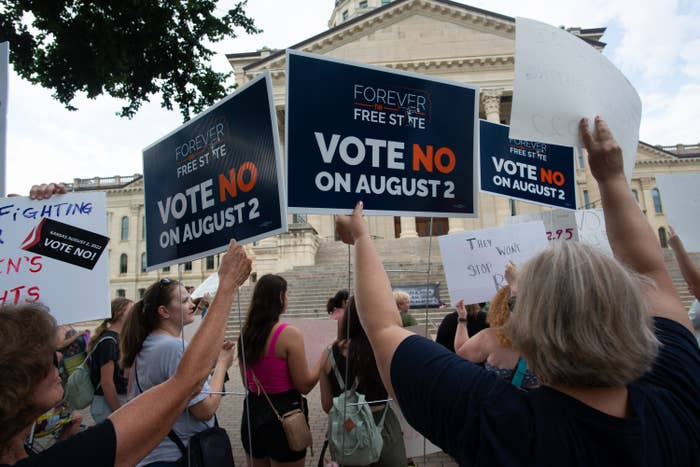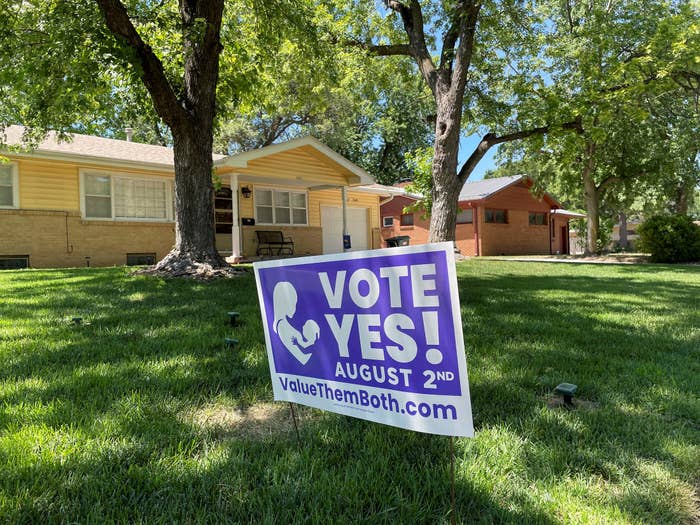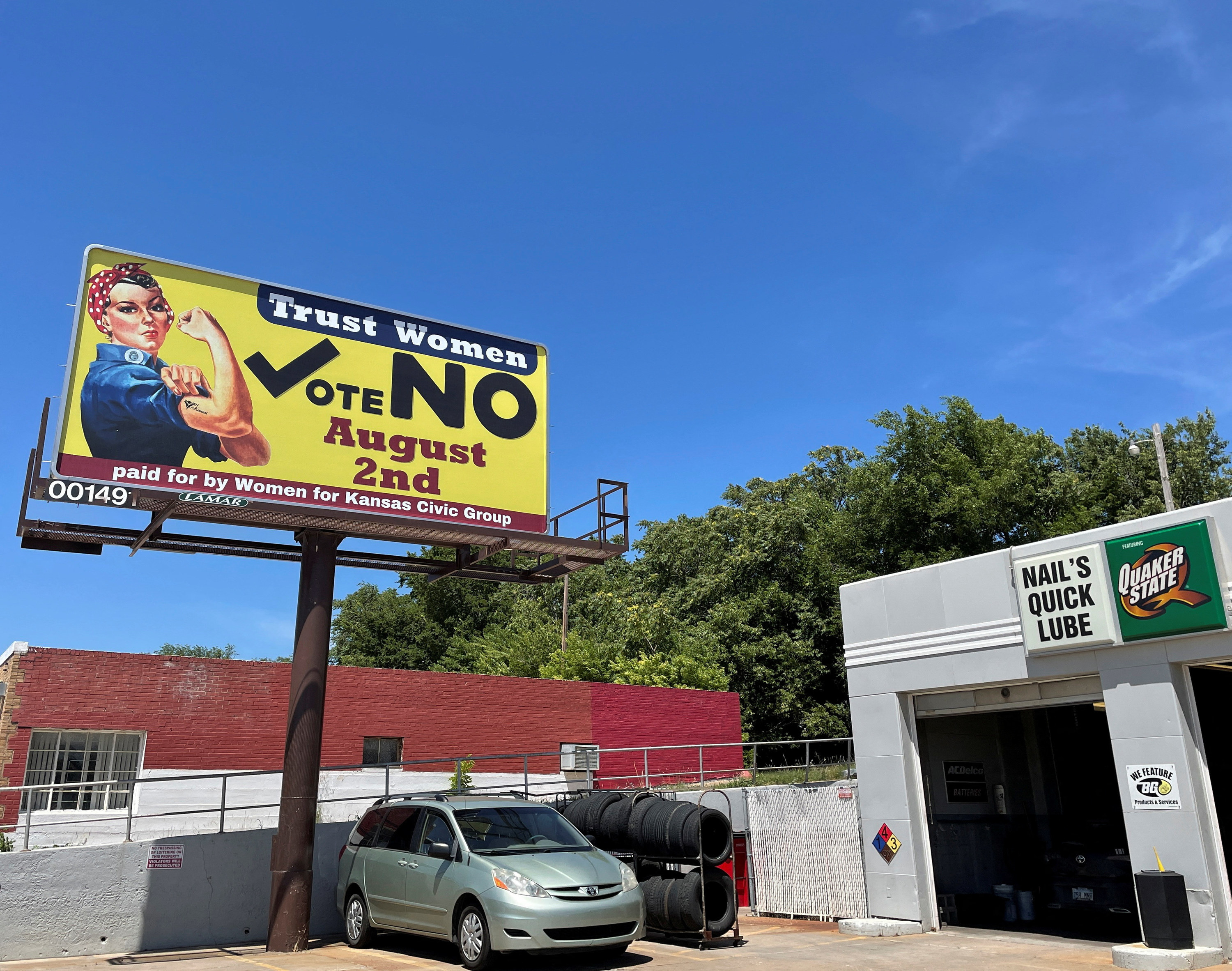
In the weeks since the Supreme Court struck down Roe v. Wade, Republican lawmakers in more than a dozen states have moved swiftly to eliminate or severely restrict access to abortion — even though most Americans believe the medical procedure should stay legal.
On Tuesday, the power goes back to the people as Kansans vote on a constitutional amendment that would take away the right to abortion and open the door to a total ban. It’s the first time that voters themselves will weigh in on the issue since the Supreme Court reversed nearly 50 years of precedent protecting people’s right to end a pregnancy, and the election will test how fired up people are to defend abortion access.
“If you are against abortion rights, you’ve had reason to be mobilized since 1973. But if you support abortion rights and maybe took that for granted, we’re in a new political reality here,” said Patrick Miller, a professor of political science at the University of Kansas. “What is happening in Kansas with the amendment and what’s happening around the country … to me would say if you’re an American who supports abortion rights, then you need to become engaged on that issue in a way that maybe you have never been before.”
Local political observers and a recent poll suggest the vote will be close; though most Kansans generally support the right to abortion, there’s been a lack of awareness around the vote and confusion over the amendment’s implications. The vote is also coming in a primary election, during which turnout tends to be low and unaffiliated voters — who might side with Democrats on the issue — typically don’t vote.
If approved, the so-called Value Them Both amendment would add language to the Kansas Constitution that it “does not require government funding of abortion and does not create or secure a right to abortion.” The proposed amendment also says that the state Legislature “may pass laws regarding abortion, including, but not limited to, laws that account for circumstances of pregnancy resulting from rape or incest, or circumstances of necessity to save the life of the mother.” A “no” vote means abortion would remain protected as a right under existing provisions of the state constitution, as held by the Kansas Supreme Court since 2019.
Republican lawmakers placed the measure on the ballot last year in response to that court ruling. If the amendment passes, the Legislature is expected to try to enact laws that ban abortion in all or almost all cases.
“We know that the Kansas Legislature is primed to introduce some very dangerous abortion bans,” Kelsey Rhodes, communications director for Physicians for Reproductive Health, told BuzzFeed News.
Representatives for the Value Them Both Coalition, which is leading the “yes” campaign, have emphasized that the amendment itself doesn’t ban abortion. But Lori Chrisman, a former regional director for the coalition, told a meeting of local Republicans in June that if it passes, there is legislation ready for a ban, according to audio obtained by the Kansas Reflector.
“We do have one ready — HB2746 — so we’ll move that up,” Chrisman said, referring to a bill introduced in March that would criminalize abortions from the moment of fertilization.
During the meeting, Republican state Sen. Mark Steffen also told the crowd that his goal was to pass laws banning abortion “at conception,” according to the Reflector.
In a statement about the audio, the coalition told the Reflector at the time that Chrisman was no longer with the organization and didn’t speak for the coalition. Mackenzie Haddix, deputy communications director for Value Them Both Coalition, told BuzzFeed News her views are “in no way reflective” of the campaign.
“The woman who recently provided her personal thoughts and comments on an outdated piece of proposed legislation that received little to no support and died in committee, was a former temporary field VTB staff, not a spokesperson, and was not part of any leadership discussions within the Value Them Both Coalition or any member organizations,” Haddix said in a statement.
Though that specific bill died at the close of the 2022 legislative session in May, lawmakers could call a special session to reintroduce it after Tuesday’s election or bring it up next year. Republicans currently have a supermajority in both chambers, meaning that they could potentially override a veto by Kansas Gov. Laura Kelly, a Democrat who is up for reelection this year.
On its website, the Value Them Both Coalition argues that because of the 2019 state Supreme Court ruling, "every abortion law is presumed unconstitutional” and that the amendment would allow Kansas to pass “basic regulations” on the procedure. But the 2019 ruling specifically said the Legislature can still regulate abortion, and state laws restricting abortion, which include a 24-hour waiting period, parental consent for pregnant minors, and a 22-week ban, remain in place.
“Virtually every abortion regulation in Kansas has stayed intact since, nor are they being challenged,” Miller said. “Yet, there have been lies circulating that abortion is unregulated.”

Miller told BuzzFeed News a volunteer for the “yes” campaign who knocked on his door tried to convince him that right now in Kansas, babies are being aborted “up until the day of birth,” which is not true.
“Some of that messaging has not been entirely honest, but they’re focusing on something that elicits an emotional response and that you’re going to get more consensus on,” he said.
Haddix declined to comment on the volunteer’s comments to Miller, saying she had “no clue who that volunteer is” and would not “speak to a situation that I am not aware of.”
Haddix said the coalition supports “reasonable limits” on abortion and that the amendment is “simply an effort to restore” Kansans’ ability to “have conversations” about it. She did not answer questions about whether the coalition would support an abortion ban, saying that any discussions about what lawmakers might do if the amendment passes “are hypotheticals.”
“If the Value Them Both amendment passes, we could enact laws that are very similar to states on the east or west coast, or we could not do anything, or we could restrict,” Haddix said, “but what we’re focused on is common sense, bipartisan limits on the abortion industry.”
The wording of the amendment has also added confusion for voters because it says that the Legislature would be able to pass laws that address rape, incest, and the life of the pregnant person, but it doesn’t require exceptions for those circumstances. To fight back against the “yes” campaign’s messaging and the amendment’s vague language, abortion rights advocates have tried to frame the issue as a matter of personal freedom — and make it clear that its passage would allow lawmakers to enact a total abortion ban.
“This isn't about reasonable restrictions,” said Anamarie Rebori Simmons, a spokesperson for Planned Parenthood Great Plains Votes, the advocacy arm for the affiliate that serves patients in Kansas, Arkansas, Missouri, and Oklahoma.
Most Kansans favor a basic right to abortion with restrictions, Miller said. A 2021 statewide public opinion survey conducted by Fort Hays State University found that over 60% of Kansans opposed making abortion illegal in all circumstances, including rape, incest, and when the pregnant person’s life is at risk. A smaller and slim majority — 50.5% — said the Legislature should not place any restrictions on “the circumstances under which women can get abortions.”
“People’s opinions on this are really nuanced,” said Alexandra Middlewood, an assistant professor of political science at Wichita State University. “How that translates into votes is really complicated.”
A recent public poll — the only one conducted specifically on the amendment — suggested that Kansas voters are split on the amendment. The survey by the research and analytics company co/efficient showed that 47% planned to vote in favor of the amendment and 43% planned to vote against it, with the remaining 10% undecided.
But Miller said those results should be taken “with a grain of salt.” The poll relied heavily on text message-based sampling, a method that he said may be less reliable. He also questioned how the poll adjusted for unaffiliated voters, who are not used to voting in primary elections.
“It's one poll that makes certain choices that I think raise some eyebrows,” Miller said. “In a perfect world, it would be lovely to get more polling that uses different methods and kind of see what the overall story is.”
Absent that, Miller said it’s difficult for him to gauge how voters feel about the amendment at this point. Still, the only outcome that would surprise him is if it’s overwhelmingly shot down, given how organized proponents of the amendment have been and the lack of awareness about it among pro-abortion rights voters until recently.
Before the May 4 leak of the draft opinion indicating that the Supreme Court would overrule Roe, the pro-abortion rights “no” campaign was “somewhere between pathetic to nonexistent,” Miller said.
“I remember doing interviews about this around the time of the leak and my impression at the time was, Where is the ‘no’ campaign? Whereas the ‘yes’ campaign had been out there campaigning for months,” he said.
Political science experts and abortion rights supporters in Kansas agreed that the draft opinion and the Supreme Court’s June 24 ruling revitalized the campaign against the amendment.
“It was a wakeup call for a lot of people … who really thought that their rights were protected and there was no reason to be alarmed,” said Ashley All, a spokesperson for Kansans for Constitutional Freedom, which has been leading the campaign against the amendment.

Before Roe was struck down, All said the organization had only about 50 volunteers knocking on doors, mostly just on the weekends. Now, they have around 500 volunteers canvassing the community every day. And since the decision volunteers have made phone calls to over 400,000 voters.
“We really have seen a significant increase in energy and engagement in all different parts of the state,” All said. “This is probably the most engaged I’ve seen people in a primary election ever.”
How they vote won’t just affect people in Kansas. If the amendment passes and the Legislature outlaws abortions outright or much earlier in pregnancy, it will mean fewer options for people across the Great Plains states.
“We already have states next to Kansas — Arkansas, Oklahoma, and Missouri — that have banned abortion and so having access in Kansas is critically important for patients in other states,” said Elizabeth Nash, state policy analyst at the Guttmacher Institute, an abortion rights research and advocacy group that tracks state legislation. “Without Kansas, these patients would have to travel much further and may not be able to make the journey at all.”
Nash added abortion rights supporters will be watching Tuesday for lessons on how to maintain or expand access to care now that Roe is gone. Voters in California, Kentucky, Montana, Vermont, and likely Michigan will consider constitutional amendments that would either expand or limit abortion protections this year.
But advocates and experts cautioned that voters in those states shouldn’t view the results in Kansas’s election as a good indicator of what other electorates will decide.
“I know that people want to look at it and see what it tells us about where voters are,” All said, “but I think there are a lot more variables in this vote that need to be considered before we can have hot takes on it.”
